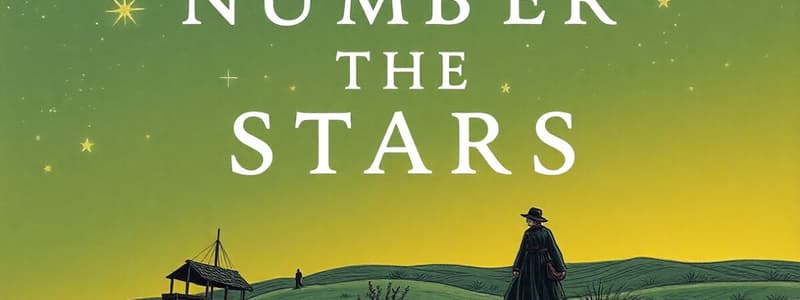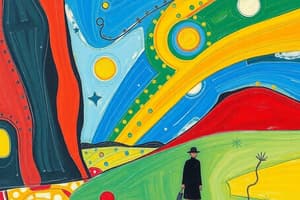Podcast
Questions and Answers
Why does Uncle Henrik emphasize that Annemarie shouldn't know too much about the escape operation?
Why does Uncle Henrik emphasize that Annemarie shouldn't know too much about the escape operation?
- To prevent her from sharing information with Kirsti, who is known for being talkative.
- To protect her from the emotional burden of understanding the full extent of the dangers involved.
- To maintain the illusion that she is still a child, shielding her from the harsh realities of war.
- To ensure that if captured, she would not be able to betray the operation, even unintentionally. (correct)
What does Uncle Henrik imply about the nature of bravery when he tells Annemarie, "That's all that brave means—not thinking about the dangers. Just thinking about what you must do."
What does Uncle Henrik imply about the nature of bravery when he tells Annemarie, "That's all that brave means—not thinking about the dangers. Just thinking about what you must do."
- Bravery is the suppression of fear through careful planning and strategic thinking.
- Bravery is a natural attribute possessed by some individuals, enabling them to disregard danger effortlessly.
- Bravery is acting in spite of fear, focusing on the necessity of one's actions rather than the potential consequences. (correct)
- Bravery is acting without fear, a state of mind achievable through rigorous training.
How does the detail about the fishermen piling dead fish on the decks of their boats contribute to the story's themes?
How does the detail about the fishermen piling dead fish on the decks of their boats contribute to the story's themes?
- It foreshadows the tragic fate that awaits some of the escaping Jews.
- It symbolizes the moral decay of society under Nazi occupation.
- It demonstrates the fishermen's cleverness and resourcefulness in deceiving the soldiers. (correct)
- It illustrates the economic hardships faced by the fishermen due to the war.
What is implied by the German soldier's caustic remark, 'At least she didn't stitch flowers on it' after seeing the handkerchief?
What is implied by the German soldier's caustic remark, 'At least she didn't stitch flowers on it' after seeing the handkerchief?
Considering the context of the story, what is the most likely reason the soldiers are using trained dogs?
Considering the context of the story, what is the most likely reason the soldiers are using trained dogs?
Why does Annemarie not reveal the full details of her encounter with the soldiers to Uncle Henrik?
Why does Annemarie not reveal the full details of her encounter with the soldiers to Uncle Henrik?
What does the detail about the baby being drugged during the escape suggest about the situation's urgency and the risks involved?
What does the detail about the baby being drugged during the escape suggest about the situation's urgency and the risks involved?
What is the most likely reason for Henrik's immediate relief upon seeing the contents of the lunch basket, specifically the unopened packet?
What is the most likely reason for Henrik's immediate relief upon seeing the contents of the lunch basket, specifically the unopened packet?
How does Uncle Henrik's statement, 'because of you, Annemarie, everything is all right' contribute to the story's theme?
How does Uncle Henrik's statement, 'because of you, Annemarie, everything is all right' contribute to the story's theme?
Consider the soldier's actions of dropping the cheese and napkin back into the basket and saying, 'Go on to your uncle and tell him the German dogs enjoyed his bread.' What is the most likely intention behind this?
Consider the soldier's actions of dropping the cheese and napkin back into the basket and saying, 'Go on to your uncle and tell him the German dogs enjoyed his bread.' What is the most likely intention behind this?
Flashcards
What is Bravery?
What is Bravery?
The ability to act despite fear, focusing on the task at hand.
What is the Resistance?
What is the Resistance?
A secret network of people helping Jews escape the Nazis.
What are hidden places in boats?
What are hidden places in boats?
A hidden compartment in the boat used to conceal people.
What is 'De Frie Danske'?
What is 'De Frie Danske'?
Signup and view all the flashcards
What was in the handkerchief?
What was in the handkerchief?
Signup and view all the flashcards
Soldier's dismissive remark
Soldier's dismissive remark
Signup and view all the flashcards
Dogs' reaction to the handkerchief
Dogs' reaction to the handkerchief
Signup and view all the flashcards
Soldier's sarcastic gesture
Soldier's sarcastic gesture
Signup and view all the flashcards
Annemarie's cautious message
Annemarie's cautious message
Signup and view all the flashcards
Henrik's relief
Henrik's relief
Signup and view all the flashcards
Study Notes
- After the soldier finds the handkerchief, he throws it to the ground, but the dogs are disappointed
- The soldier tells Annemarie to tell Uncle Henrik that the German dogs enjoyed his bread and the soldiers disappear
- Annemarie picks up the apple and handkerchief, and runs to the harbor to find Uncle Henrik
- Annemarie tells Henrik that soldiers stopped her and took his bread
- Henrik is relieved that the packet is in the lunch basket, though it was torn open
- Henrik says that everything is alright and tells Annemarie to tell her mama not to worry
Chapter 16
- Annemarie recounts the events of the day, including having to milk Blossom the cow
- Kirsti asks where Ellen is and Mama replies "Ellen had to go with her parents."
- Uncle Henrik takes Annemarie to the barn for a milking lesson
- Annemarie asks Uncle Henrik where the Rosens and the others are noting they were not on his boat
- Henrik tells her that he will tell her "just a little because you were so very brave."
- Annemarie expresses she was frightened but Henrik explains that being brave means "not thinking about the dangers"
- Henrik explains that many of the fishermen have built hidden places in their boats to hide people
- Peter and others in the Resistance bring them to Henrik and other fishermen, to take them along to Gilleleje
- Annemarie realizes Peter is in the Resistance because he brings her parents the secret newspaper, De Fret Danske
- Uncle Henrik states that the Rosens and the others were underneath the boat when she brought the basket and had to be quiet
- The baby was drugged so it wouldn't cry and the Rosens heard Annemarie and the soldiers on the boat
- The soldiers are searching all the boats because they know the Jews are escaping
- The hiding places are concealed, and often dead fish are piled on the deck
- Annemarie asks Uncle Henrik about the handkerchief and how it could be important
- The soldiers just started using trained dogs to sniff out where people are hidden so Swedish scientists created a special drug in the handkerchief
- The drug attracts the dogs, but ruins their sense of smell, meaning the boat captains will pull the handkerchiefs out of their pockets while the dogs will find nothing
Chapter 17
- The war ended almost two years later, when Annemarie was twelve
- Church bells rang all over Copenhagen, the Danish flag was raised everywhere, and people sang the national anthem of Denmark
- Peter Neilsen was captured and executed by the Germans in the public square and his letter said he was proud to have done what he could for his country
- The Nazis refused to return the bodies of the young men they shot at Ryvangen, burying them there and marking the graves with numbers
- Annemarie's parents told her the truth about Lise's death stating that she was part of the Resistance
- Lise was hit by a car from the military while trying to escape the Nazis during a raid
- Annemarie finds Ellen's necklace in Lise's yellow dress, and asks Papa to fix the broken clasp so she could wear it until the Rosens come home
Afterword
- Annemarie Johansen is a child of the author's imagination, though she grew from stories from Annelise Platt
- Annelise described the courage and integrity of the Danish people under the leadership of King Christian X
- In 1940, Denmark surrendered to Germany because the country was small and undefended, with no army against German forces
- King Christian allowed them to occupy everyday existence but he rode alone on his horse from the palace every morning to greet his people
- In August 1943, the Danes sank their own navy in Copenhagen harbor as the Germans approached to take over the ships
- On the New Year of the Jewish High Holidays in 1943, the rabbi warned them that they were to be taken and "relocated" by the Germans
- G. F. Duckwitz, a high German official, told the Danish government, who passed the information to the Jewish community
- The Jews fled into the arms of the Danes, who took them in, fed them, clothed them, and hid them
- Almost the entire Jewish population of Denmark—nearly seven thousand people—was smuggled across the sea to Sweden
- Swedish scientists created a powerful powder composed of dried rabbit's blood and cocaine, and put it in the handkerchief
- The blood attracted the dogs, and when they sniffed at it, the cocaine numbed their noses and destroyed their sense of smell
- Peter Neilsen represents the courageous and idealistic young people from the Danish Resistance
- Kim Malthe-Bruun was captured and executed by the Nazis when he was twenty-one years old
- Malthe-Bruun wrote that people must "create an ideal of human decency, and not a narrow-minded and prejudiced one."
Studying That Suits You
Use AI to generate personalized quizzes and flashcards to suit your learning preferences.





